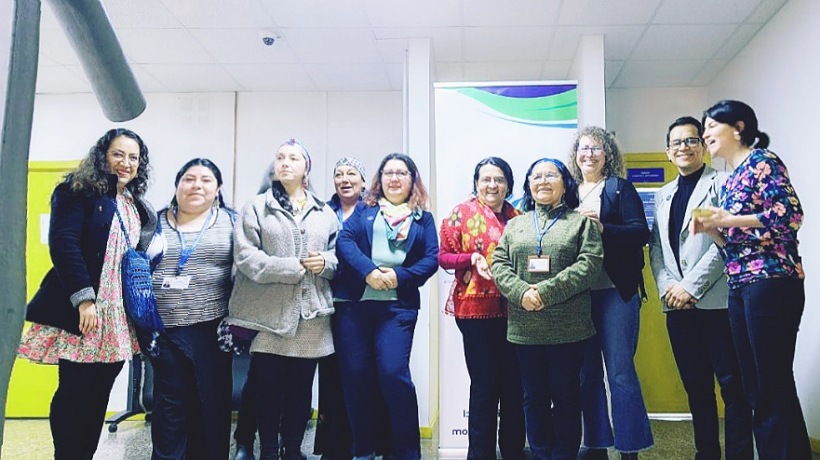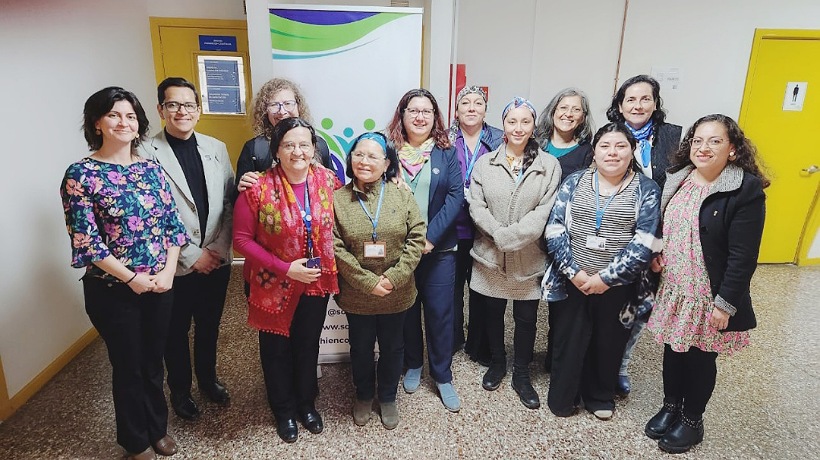Last December 1st, the intercultural facilitators of the Chilean Health System, Yanet, Candelaria, Pamela and Daniela; Professors of the Nursing School of the University of Los Lagos, Sandra Sandoval Barrientos, Ma. Bernardita Pilquinao Pilquinao, Betty Antiñirre Mansilla, Carlos Fernández Silva, Ana Ma. Araya Ugarte; the Holistic Nurse of the CESFAM Dos de Septiembre de la Comuna de los Ángeles, Lucy Jure Cares and the guest Professor from Mexico, Karla Ivonne Mijangos Fuentes.
By Karla Ivonne Mijangos Fuentes
The discussion was held in commemoration of the tenth anniversary of the school of nursing, and for this, Professor Sandra Sandoval, as head of the course, welcomed all those present and announced that it was a moment of exchange and synergies. Sandra commented that the discussion was free and that anyone who wanted to speak could do so; needless to say, the question to be addressed was: What is health from the cosmovisions of each one of us?
What is health from the worldviews of each culture?
In this respect, Candelaria ñaña took the floor and said that health for the Mapuche people is like a plant that grows, like a plant that has to be watered, cared for, protected and nourished, and all this means taking care of the plant so that it lives well and dies well. She stressed that the plant must be in harmony with Pachamama, with people, with food and everything that allows it wellbeing.
Karla commented that from the Zapotec cosmovision of the central valleys of Oaxaca, in Mexico, there are two concepts that are transposed, on the one hand there is health that has to do with the institutionalisation of bodies, that is, with the health system (ambulances, doctors, medicines, surgeries, hospital, etc.); and the other concept alludes to healing or a healthy body, which represents eating well, feeling happy, full, not having pain, dancing, singing, feeling good. Therefore, the person must be in balance with the ecosystem, with people, with the deities, the spirits, the soul and the body. Karla also stated that for the Zapotecs there is no such word as illness, but rather they call it a bodily imbalance, which must be repaired.
ñaña Yanet confirmed that the Mapuche people also believe in bodily imbalances, therefore the machi, who represents the medicine woman of the people, is the one who assesses and identifies the type of imbalance in the person to achieve harmony and healing. Illness is the term that Western medicine has created to constantly medicate people, and illness is what has dehumanised doctors because they no longer attend to the person but to the illness.
 Image by Karla Mijangos Fuentes
Image by Karla Mijangos Fuentes
In this line, ñaña Yanet commented that Mapuche medicine has as its logic the prevention of imbalances and the promotion of health because they try to lead a life in harmony with mother nature, on the contrary, Western medicine only prioritises illness and downplays the importance of prevention. In this sense, Karla, from the results of her research, made Yanet’s words her own to comment that the medical hegemony has as its precept to attend to the sign and the symptom and not to the whole as a human being.
Those present agreed that it is necessary to move towards humanised health.
Continuing with the common thread, Candelaria said that medicine today is highly dehumanised, that the doctor no longer looks at the person and thinks that the sign or symptom is what should be attended to, but does not go to the root of the problem, unlike the machi who looks at the symptom in all its complexity and context with the person, even if the imbalance is related to western medicine, she refers the person to the doctor. She said that many people go to the doctor with a health problem, but that is only part of the whole picture of the imbalance the person is in.
Professor Carlos, who lives in Puerto Montt and is originally from Colombia, also pointed out that hegemonic medicine does indeed attend to the symptom and signs, therefore, as health professionals, we should return to the cosmovision of indigenous peoples, where the person is attended to in all his or her splendour.
Candelaria also commented that doctors use a standardised and terminological language that only they understand, without realising that this distances them from the people and that this language is the only thing they master since doctors do not know how to talk about other issues; topics that should interest them, such as global warming, the exploitation of land by foreign mining companies, current politics, and economics, among other human rights issues.
Among other main points, Professor Beatriz claimed her Mapuche roots and recalled how they were healed through traditional medicine, she talked about the medicines offered by mother nature, the rituals that are part of the healing of the soul and spirit, and also how much nursing or western medicine has moved away from what health is.
In this context, the teacher Bernardita questioned the members of the discussion _How to prepare the students in the classrooms? _ When it is known that the system does not allow access to this look, so she reflected on her feelings, that in her teaching practice, she talks to the students about interculturality in health, but in practice, they live another reality, so she questioned how to prepare the student emotionally to face this frustrating reality.
In this regard, Candelaria, followed by Yanet, Pamela and Daniela, said that Bernardita and other teachers had to break with the structure and the system and that many times one does not have to request permission from it, but rather one has to break in for it to make part of it. Candelaria told Bernardita to speak frankly to the students, to explain to them that many things are achieved through struggle, and an example of that struggle is that they are now part of the system, when before they had no political participation whatsoever. So, the fact that today they are part of the health system was not due to a non-violent granting of rights, but because the Mapuche people had to fight and demand to be there.
Daniela added that she was very happy to be able to enter into dialogue with the professors present and that they were in the best possible position to co-construct together with the university professors because many more spaces like this one are needed to talk about the representations of health and illness from the Mapuche and other peoples, as well as from conventional medicine.
To close the discussion, Sandra thanked all those present for their participation, as well as for the contributions that opened the way for a paradigm shift and new ways of caring for people. Finally, Lucy said that she had reserved herself to speak because it was very interesting what the Mapuche sisters were saying, however, she also considers the person as a plant that should be cared for in different ways, because for her the person should be the most important thing and the ways of caring for the body should be the complement, that is, therapies such as reiki or singing bowls, allopathic medicine, traditional medicine, among other elements are those that should be combined and made available to the person so that he or she can achieve a state of balance and healing.










